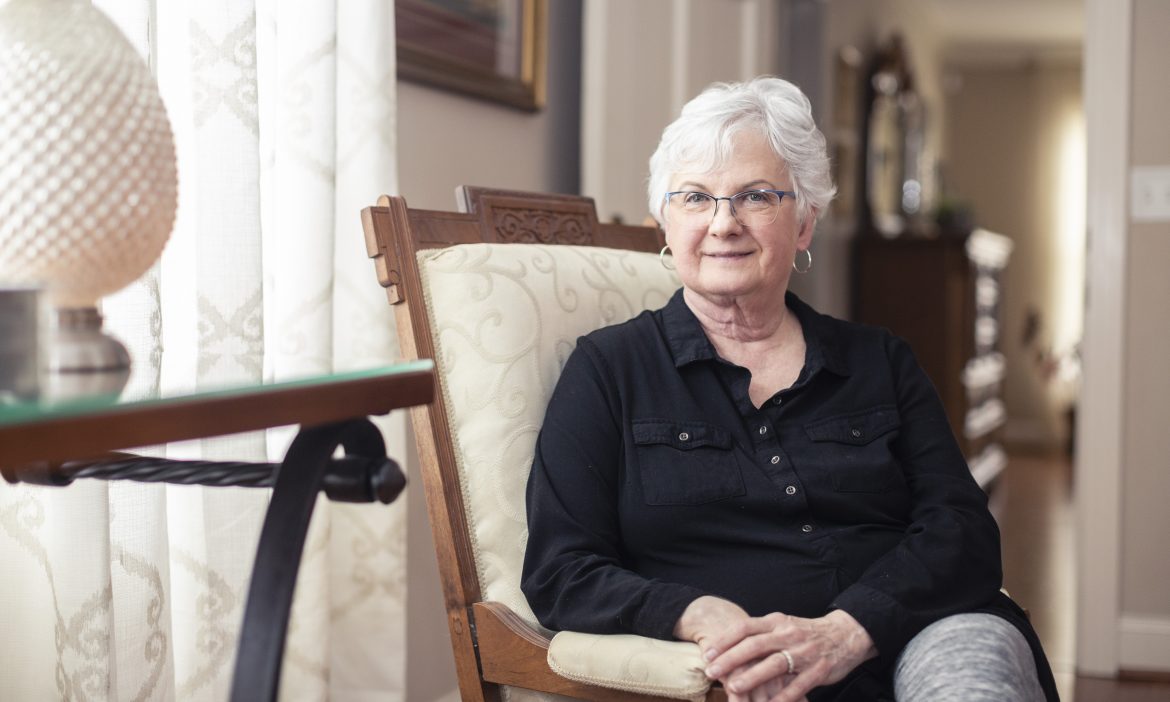Rachel Myers clearly remembers the day in 2016 when something felt off.
“I had taken my grandson to school, and I had a sore spot in my mouth,” the Chattanooga resident says. “I called my dentist, and he said, ‘Stop on your way back home and we’ll look at it.’ And we started from there.”
“The sore spot was only painful at first, but I just knew something was wrong.”
Rachel had already lost two loved ones due to progressive disease.

“There have been three generations of cancer in my family,” she says. “My mother passed from breast cancer, and my daughter passed from triple negative breast cancer in 2015. I was her caregiver during that time, along with my son-in-law. My grandson was only 4 years old when we lost her.”
Even with that family history, Rachel wasn’t jumping to conclusions — but she also wasn’t waving off nagging suspicions. However, for 13 months from the time she noticed the spot, she watched it change almost daily – and saw many specialists in the interim, even having a biopsy which came back negative.
During a routine cleaning, her dentist strongly recommended she seek another opinion and biopsy. In July 2018, that test confirmed Rachel had oral cancer. A flood of emotions nearly overwhelmed her, but fortunately she had faith and family to lean on.
“My husband Jeff and I have traveled and pastored for several years, and he’s been so supportive of me,” she says. “All my family is here in Chattanooga, which has brought me strength, as well.”
Those pillars of support would be critical as Rachel faced surgery to remove her cancerous growth in September 2018.
Treating the whole person
Part of Rachel’s support system was a dedicated team of care managers at BlueCross. A nurse on our transitional care team recognized Rachel as a candidate for emotional support due to her upcoming surgery.
The nurse asked Rachel for permission to have a behavioral health representative contact her. Rachel agreed and began speaking over the phone with case manager Katie Parker.

“Mrs. Myers and I first spoke the day before her surgery,” says Katie, a licensed clinical social worker who got her start in hospice and nursing home social work. “Our transitional care team picked up on her anxiety, which was incredibly normal for her situation. But even when someone says they’re stressed and concerned, they have to agree to the referral.”
Fortunately, Rachel was receptive, which allowed Katie to assess the situation, understand her needs and build a rapport.
“She was nervous as she was facing a major surgery and had her family history on her mind,” Katie recalls. “During that initial conversation, we agreed to talk again after the surgery. That gave me plenty of time to prepare a list of resources I thought she would benefit from.”
Katie typically works with members like Rachel who have a medical diagnosis and were referred because of secondary emotional stress or depression.
“My goal is to encourage them to research and seek their own therapy while offering ways to connect with resources like community mental health programs or support groups,” Katie says. “We support, we advocate, we encourage, but our goal is to give them as many good choices as possible and let them choose the path forward that makes the most sense for them.”
Katie says good listening skills are the way to build trust. “When I can give my members time to talk and then repeat what I’ve heard, I validate their feelings and ensure my understanding of their situation.”
Rachel was grateful for the empathetic ear.

“Katie was kind and compassionate from the beginning,” Rachel says.
“She always seemed to call when I needed to vent. And it was kind of a good feeling to know somebody was going to listen.”
‘One day at a time’
On Sept. 6, 2018, Rachel had surgery to remove the cancer, followed immediately by reconstructive surgery on her neck and throat. Recovery in the hospital was difficult, and she spent time in intensive care.
Though Rachel’s less than a year removed from the biopsy that identified her cancer – and has been told to expect a year-and-a-half recovery from her surgery — she’s still dealing with numbness and a few question marks in terms of long-term effects.
“I can’t feel my ear to put my earring in, and there are a lot of other similar things that may be permanent,” Rachel says. “I’m just dealing with them one day at a time.”
Rachel’s last CT scan was in late April. She’ll see her surgeon every three months for two years following her surgery and has not needed radiation treatment. She currently attends the Hope Program, a cancer survivors support group that Katie connected her with before referring her to a medical care manager.
Katie finds closing her work on a member’s case satisfying.
“We close a case when we see all goals are being met,” she says. “Mrs. Myers was accessing the resources we discussed and discovered together.”
“Her story is a great example of all our departments working together for the benefit of one member.”
Giving voice to healing
Throughout her recovery, Rachel has been unable to travel with Jeff or participate in their ministry – an avenue which normally would provide her comfort and inspiration.

“My part of our ministry has been music, and that was a big concern when I found out about this,” Rachel says. “Singing is what I’ve always done and love to do. I’m not much of a speaker, but if I have a song that tells a story or conveys a message, I can do that.”
However, when we spoke, Rachel had only recently gone back to singing, having done so the last three Sundays at her church. She was apprehensive at first, but felt a great weight had been lifted when she finished her first song, “I Believe,” made famous by Jimmy Fortune.
Just a phone call away
Though Rachel is on the road to recovery and no longer needs behavioral health services BlueCross offers, Katie can still be there for her.
“We always make sure our members know our department is still available,” Katie says. “If they’re feeling a change in mood or unsupported at any point in time, they can restart the case the next day. Mrs. Myers knows I’m here and happy to take a call from her.”

Rachel agrees and offers some advice of her own.
“I really was surprised that BlueCross offers these services,” she says. “I would encourage anyone who’s struggling or doesn’t know where to turn to accept that call from BlueCross and talk to them. It will help you.”


 Jesse joined the BlueCross BlueShield of Tennessee corporate communications team in 2017. A Chattanooga native, he has more than 15 years’ experience in content creation, management, and strategy for consumer audiences, including a six-year stint in health care marketing.
Jesse joined the BlueCross BlueShield of Tennessee corporate communications team in 2017. A Chattanooga native, he has more than 15 years’ experience in content creation, management, and strategy for consumer audiences, including a six-year stint in health care marketing.